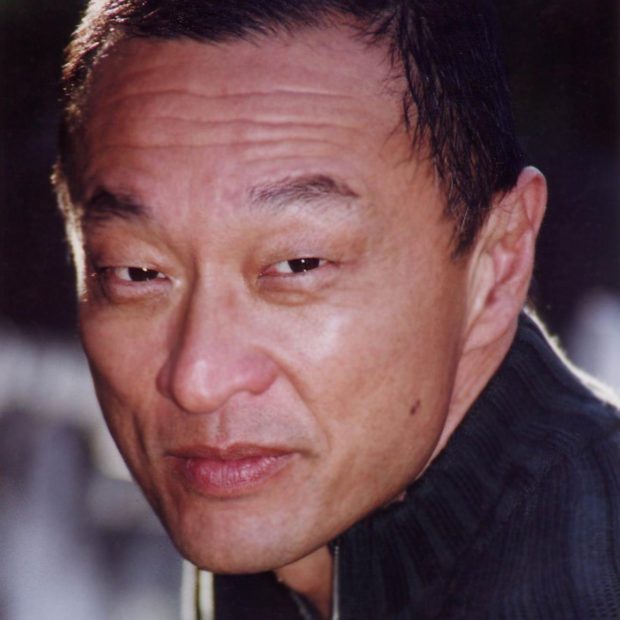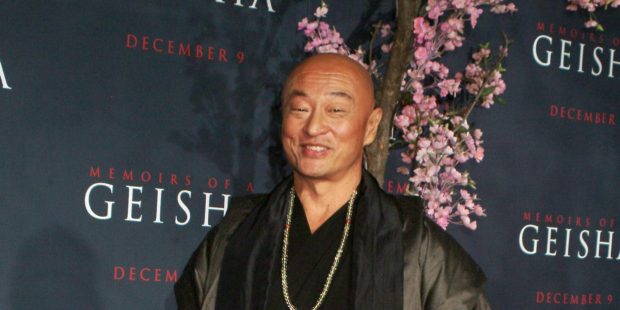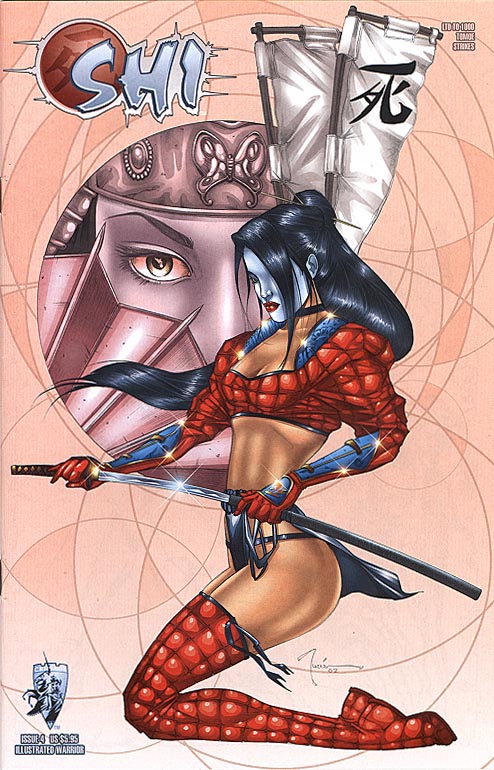
Amidst the madness of the Comic-Con, we found a spot of calm in meeting Cary-Hiroyuki Tagawa. If the name doesn’t quite ring a bell, trust us, you’ve seen him and you’ve enjoyed his performances. After making his official film debut in Bernardo Bertolucci’s The Last Emperor, Tagawa played a lot of heavies until making his mark as the slick Eddie Sakamura in Rising Sun. Fanboys, however, may best remember him as the evil Shang Tsung in the first Mortal Kombat, still the best adaptation of a video game to film. In addition to his years of acting, Tagawa teaches martial arts, writes, designs clothing, and, as you’ll read, has a strong grasp of history. Contrasting some of his bad guy roles, Tagawa greeted us warmly and spoke softly but openly about his time in Hollywood.
Derek McCaw: Let’s get the obvious out of the way. Tell me about the role of Krull in Planet of the Apes.
Cary Tagawa: Sure. Krull was an added character. He wasn’t in the original script. In fact, I had been cast as Attar, Michael’s (Clarke Duncan) character. I was being fit for the costume when they announced that Michael was coming on board and in the middle of that I said, how can I play a General to and then I thought, oh, my god, what if he’s gotten the part? You know? So they aced me and sure enough they said, we’ll have to wait until the next draft to see if Cary’s in it.
Tim decided that although Michael was going to play Attar that he would still want me to be in the film, so he created Krull. And this character originally was an aging silverback gorilla servant who was in Ari’s, Helena Bonham Carter’s, household. I had a conversation with Tim. I said, Tim, I’m going out with the hero group, right?
Yeah.
Don’t you think it’s kind of a waste just to have me this aging, you know, standing next to a woman all of the time?
I mean I’m still kind of macho. Especially the physical kind of stuff. Why have an aging guy who can’t move and is always whining? You know, kind of cowering? So I said alright, Tim, here’s my backstory. I was a General in the Red Army, opposed Thade, he was going to have me killed. Ari’s father the Senator befriends me, under two conditions which Tim (Roth, playing Thade) gives him, which is one to be a servant and two never have anything to do with the Red Army again.
Which gives me the opportunity, as I get out of the household, to really become the warrior again. And so he loved it, and I really collaborated with Tim to build Krull up into this character that has, figuring I’m really going to be the only other male in the group, as a monkey, with Helena being the chimpanzee. It also gave me something to work off of Mark. If you’re a cowering silverback in the background, you never have this male vibe that should be going on. So it also allowed me that. We had moments where I don’t like humans and I let him know, that kind of thing. Krull is a warrior servant.

DM: You mentioned that Tim added you back in and saved you for the movie. Had you worked with him before?
CT: No, I hadn’t.
DM: So he really just took a shine to you?
CT: Yes. It’s interesting because this part wasn’t written for an Asian; it wasn’t described in the script that way. Attar or Krull. I was kind of curious why he chose me. He said it on his own in the beginning. It was two things. One was my movement, which I’m very conscious of in films, especially coming from martial arts. Think about how many times a character is seen just sitting or walking or standing, it’s a lot of time in film and it says so much about a character. So I’ve always been keen to pay attention to movement and that was one thing he said he noticed. Never have I heard a director talk like that about me. And also he said that the eyes were important because it really has to come through the make-up. So he was interested in those two aspects especially. He did mention the four-hour make-ups. “Oh, by the way…there’s this thing about make-up…”
DM: But it’s worth it, right?
CT: Oh, yeah. As an actor, the fantasy is to have such a range in your career. I have to say that certainly in my career I’ve come from playing a eunuch (The Last Emperor) to a playboy (Rising Sun) to an alien (Space Patrol) to a surfing grandfather (Johnny Tsunami) and now to playing an ape; I can’t complain. In my career I’ve had certainly more than the average opportunity to have that range.
DM: You’ve touched on an issue that I was going to ask you about, which is the ethnicity of the apes. This seems to be the first time I’ve seen you in a role in which your ethnicity really doesn’t matter. Do you feel as you look back that there are things you didn’t get because of that?
CT: One thing that I’ve always done in my life in general, I was born in Tokyo and then raised in Louisiana and Texas and North Carolina on army posts. And we know that Japanese weren’t received very well after the war. So this was ten years after the war that I grew up in southern America.
DM: That little hint of a drawl comes through when you say that.
CT: Yeah, it does. I’m a bit redneck. (laughs) I know how to deal with the odds. I’m the kind of guy when you say one in a million, I say I’ll take it. You tell me there’s none in a million, I say I’ll make one and then I’ll take that one. So nothing ever stops me. Certainly coming into Hollywood, I knew that there would be certain limitations. But I also couldn’t play a woman or I couldn’t play a white hero. To play Asian and to speak with accents because I speak Japanese, it never really bothered me. All I always look for in every piece is how can I use this piece to move to the next step? So the worst thing about playing Asian bad guys would be to not be remembered. Really. That part of it I think I’ve achieved so far with a kind of an intensity different from other bad guys. Always knowing that eventually I would get an opportunity if I hung out long enough. Look at Tommy Lee Jones. People didn’t take him seriously for a long, long time and he’s been around forever. But because he persevered and people started falling off, all of a sudden the quality of actor, his ability, was truly highlighted and of course he did go on. I kind of feel like I’ve done that in a certain way. People think I just kind of showed up around Mortal Kombat or Rising Sun but actually, this is my fourteenth year. It’s the same old thing.

DM: I ran a check on you on the internet, and you’ve worked with some incredible directors. Burton, obviously, but you’ve got Bernardo Bertolucci, you were in Big Trouble In Little China for John Carpenter, Philip Kaufman, the other Paul Anderson, (Cary laughs) I think he’s Paul W.S., Edward James Olmos’ film (American Me), you’ve really had a career that’s a who’s who. Are there any great directors that you’re still hoping to yet to work for?
CT: That’s a good question. There was a time when I was really excited about working with Spielberg. I kind of feel like I may have missed the Spielberg peak. I have to say that only because I really liked A.I. for what it was, but it didn’t feel like a Spielberg movie or really a Kubrick movie.
DM: It was a strange feeling.
CT: When a director puts out a film that looks like somebody else’s film, then it’s kind of like “what’s left for you?” When you start doing remakes…you do remakes because you’ve run out of creative ideas. I’m just wondering after the range of what Spielberg has done, what his next…it could be Memoirs of a Geisha, which would be interesting. He had at one time talked about directing that.

DM: I think it’s still on his plate somewhere but something else keeps coming up.
CT: And now he’s talking about maybe just producing it. I’d be anxious to work with him in the right project, but not something that’s just a run of the mill thing. Other directors? David Mamet, guys like that. Or (John) Boorman, if he can still walk. I don’t know how old he is. Actually some of the directors that I can think of, that I grew up with, that I was really impressed with, wouldn’t still be around. I got started so late, but David Lean and those kinds of guys are who impressed me. We’re having it seems like a lack of new young directors who have that kind of ability. Although I’m sure that at some point there will be, so if I can hang out long enough…
DM: What about Paul Thomas Anderson?
CT: Yeah. But Paul W.S. Anderson, I have to say, had a genius in Mortal Kombat. I haven’t seen that genius repeated in any of his other movies, but for what the video game to movie genre was at that time, he certainly was fighting the odds. It’s like taking a classic novel and trying to bring it to film. You’re talking about a classic video game. You’ve got a lot of kids who are monks. They go home afterschool, trying to get their frustrations out, wondering if they were even going to make it home and not in a body bag. So video games have that kind of religious feeling for them. I watch my son certainly do that. For other reasons, but I knew that across America video games had that kind of thing; it was more important almost than anything in their whole lives. I liken Mortal Kombat to calling all the monks to church. You have this big church meeting. And to take that techno music and do it to martial arts was a stroke of genius. It really needed that kind of intensity to bring the characters out. I felt like being the English street kid that he was, they were really fortunate to have him do that. To create such a great expectation about him as a director, and I didn’t see that in Stars My Destination and Event Horizon. So I was glad to catch him in his peak. (laughs)
DM: Since we’re at the Comic-Con, we really should explore this: You have been mentioned as being involved with Shi (a popular independent comic created by Billy Tucci)?
CT: Hmm. Shi.
DM: Is that true?
CT: Yeah, yeah, it’s true. It’s gone in and out, back and forth, and the latest rumor, I’ll spread some more rumors…
DM: Go ahead.
CT: Michelle Yeoh. At one time, or the latest one that I heard about six months ago, she might be doing it, and I’d love to work with her. Then I heard rumors that Jet Li was going to play my part. I was like (laughs nervously)…but I was told by Billy Tucci that he felt that I would be very good in the role. It’s certainly not out of my range. The character, Arashi, is very interesting. What I liked about the character, being the heavy ex-Yakuza guy that he was, was that he is an artist. He was into being an actor, so I thought that’s cool, I can relate to that. And he’s a character with depth and I certainly would love to do that. You never know what studios do with great projects, and of course Billy has been going through it back and forth. He’s gotten frustrated with the whole thing. That’s always the problem. We’ll see.

You asked what directors I’d like to work with, and in the future, I’m wanting to hook up with Japanese animation. I just came from Tokyo doing the publicity there. I think the greatest crime that we experience of racism in this country is when we say “THE” Japanese; we’ve been saying “THE” Chinese for a while. As if they’re all responsible for the inequalities. They’re having it done to them, but we all put them into this one lump to say “THE” Chinese. It was very clear when they announced the Beijing Olympics, people were crying, overjoyed because of the change that was going to happen to make it better. These are obviously not the evil empire kind of people. It’s full of people who are great people, and we tend to do that with everybody. And now having said that…”THE” Japanese. There’s such a level of Japan ink that is totally creative, and we’ve seen that in Japanese anime. I would like to be part of a move with them to make a shift toward the west easier, and do an American-based animation. Or the characters could be speaking English.
DM: And you don’t think Final Fantasy was that?
CT: One thing I have to say about Japanese anime is that there’s a certain sort of tone there that bypasses the Asian part. And the characters really turn into something more Western. I’d like to see a true Japanese character. We don’t need to make the eyes look round, we don’t need the light in her hair. We can have dark hair and the eyes look like mine. They can be speaking English. We have Asian-Americans. And certainly there are plenty of people from Hawaii that are very Asian and totally local. It’s part of America. There’s a lot of things in Hawaii that I would like to bring out, a lot of stories. The internet started in Hawaii. Hello? Why would it start in Hawaii? Because it was military based, and anything they want to test in the military they test in Hawaii. It’s the closest of all the services being together in one place. Currently they’re testing military credit cards there. Hawaii is the central point for fiber optics between Asia and the U.S. It’s like the perfect place, culturally, to understand what our future is about, East/West.
If you took the discipline and the spirituality of the East, and the freedom and creativity of the West, and put those four things together, who could stop you? And yet we’re at each other’s throats. The Japanese don’t understand. We don’t know “THE” Japanese. And certainly I do, and have had to, deal with being responsible for a lot of their actions. But I think there’s a lot more creativity available there. I’m even more excited about hooking up with them than any more Hollywood stuff. I’ve kind of done my Hollywood round. I’m certainly going to have to keep my foot in the door, but I’m looking for new venues.
DM: You’ve had your TV series, you’ve done all kinds of stuff.
CT: There’s some other TV series to be done, but on my terms. No more on their terms.
DM: I also see you’ve got a clothing line, called Mu?
CT: That’s part of what’s coming. Of course, we had Atlantis this year, and there’s still an uncharted area of the planet called Lemuria. So Mu is the short version of that. As Atlantis was the continent between Europe and the United States, and Mu was the continent between the United States and Asia. So considering that the Pacific Ocean is the largest body of water in the world, there’s a huge chunk of land there. Hawaii was the middle of it, we know that. The volcano on the big island, Mauna Kea, from the top to the continental shelf, is higher than the Himalayas. So when there was no water in there that was the highest point on the planet. Now that was the middle of that continent. Sixty million people, all different races, they’ve found the symbols in Egypt, Scandinavia, Nigeria, all talking about the motherland. And so this clothing line is based on that. With a new comic book character. I didn’t mention that, did I?
DM: Please do.
CT: My comic book. It’s coming. We’re in discussions right now. Next Comic-Con, I’ll be there with that.
DM: Self-published?
CT: Self-published through this other guy. I’m looking very clearly, I’ve always played a lot of bad guys and warrior kinds of characters. This story clearly draws a distinction between soldiers and warriors. All native cultures had warrior energy, and certainly non-native cultures have had soldier energy. And to have superior warriors be defeated by guys who can only pull a trigger, there hasn’t been that distinction made enough, I think. What I’m going to do is make it a futuristic character who has to sort of work through that.
DM: You’ll be writing that yourself?
CT: Oh, yeah.
DM: You do have a screenplay credit as well.
CT: I don’t know what.
DM: Camp Ninja?
CT: Oh, yes. I co-wrote that. But there’s another one that someone had mistakenly put on there, but that one, yeah, that’s right.
DM: Do you have an artist lined up?
CT: No. But the guys have a number of people to choose from. In fact, I’m supposed to meet two of them today. I’m really excited about that. The future is to do your own projects, to own your own projects. No more serving. With no limits.



